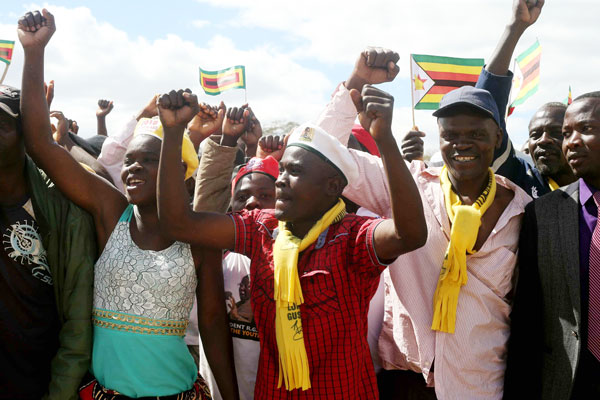
Parliament resumed briefly on May 7, which gave the minister of Finance, Simba Makoni, a chance to address us on the state of the economy.
It was the first statement made by a Zanu PF minister post the presidential election and it was remarkably candid.
Makoni told the house that inflation was running at 112%. His report, he said, was “another instalment to the accumulating record of economic decline”; he stated that farmers should be able to “farm without disruption” and that there should be an “end to violence”. He could have been speaking for the MDC.
His remarks regarding violence resonated with me as I had just received word of yet another death threat.
A well-placed and trusted source had warned that a hit squad had been formed to eliminate me and three other white members of the MDC, Auret, Bennett and Cross.
I commented at the time: “I am by no means paranoid, I have had death threats more direct than this before, but what’s alarming about this case is the identity of the source.” Makoni’s comments regarding farmers were pertinent too — since the election there had been a more intensive effort in many parts of the country to force farmers off their land.
My interpretation at the time was that Zanu PF had been shocked by the resilience of the MDC’s support, especially in commercial farming areas.
Despite all the violence, threats and murders, thousands were still voting for the MDC in these areas. Without the massive rigging Mugabe would have lost by a country mile; Zanu PF recognised that without destroying white commercial farmers once and for all, they would be hard-pressed to win the next parliamentary election, which would take place in 2005.
- Chamisa under fire over US$120K donation
- Mavhunga puts DeMbare into Chibuku quarterfinals
- Pension funds bet on Cabora Bassa oilfields
- Councils defy govt fire tender directive
Keep Reading
Makoni’s speech, although welcomed by us, set him on a collision course with Mugabe, resulting in his removal from cabinet a few months later.
Having sat for only two days, parliament was adjourned to August. In the two years since our election, Zimbabwe was in a greater crisis than ever.
Parliament itself had been undermined; our failed attempts to persuade MPs in the government benches to change course gave rise to growing cynicism among our supporters about the value of pursuing change through the legislature.
Likewise, our inability to use the legal system and courts to secure justice made many question this non-violent method. At this time, I was interviewed by Philip Gourevitch, author of the book We Wish To Inform You That Tomorrow We Will Be Killed With Our Families, which tells the story of the 1994 Rwandan genocide.
I told him of the growing desire for revenge expressed by our supporters: “What we hear at many political meetings is people saying, ‘Will you please just look the other way for 48 hours?’” I felt that we could still prevent revenge attacks “if a firm, clear message of change (was) articulated”, which should include a truth commission going back to UDI, November 11 1965, as “many of the crimes committed since then (were) better understood in that context”.
I spoke of the “miracle” that had happened regarding race relations in Zimbabwe. Despite Mugabe’s attacks on whites, who in turn had been “disengaged from black people”, there was an irony in that it had “taken this drama for (some white) people to realise that there (were) outstanding black people”.
In the same article, Judge Washington Sansole agreed, saying, “That race thing is just a red herring.” For all Zanu PF’s racist invective and violence directed against whites, there was little chance of racial conflagration.
Rather, our growing challenge was to retain the commitment of our supporters, especially young black people, to the path of non-violence. The greatest threat to our pursuit of non-violence was Zanu PF’s own violence directed against our supporters, and our inability to protect them.
As Solzhenitzyn postulated, “violence does not exist alone and cannot survive in isolation: it is inevitably bound up with the lie”. In my view, the best method of exposing the lie remained in speaking truth to power through parliament and the courts, compromised as these were.










